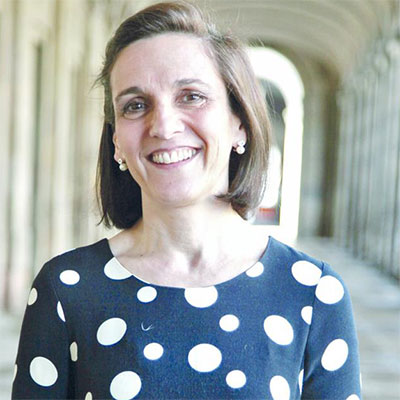Associated researchers are university professors seconded to IBEC with an agreement signed between their university and the institute who are working on topics that are of interest or complementary to our research areas.
They participate in IBEC’s scientific strategy, academic activities and support initiatives, and have the option to submit project proposals and papers with IBEC affiliation.
Recruitment is carried out according to several criteria such as scientific excellence and alignment with IBEC’s institutional strategy. Associated researchers are approved by the Scientific Advisory Board, which evaluates their performance on a regular basis.
| Jordi Alcaraz (UB)
| Carlos Alemany (UPC)
| Marino Arroyo (UPC)
| Alícia Casals (UPC)
| Maria-Pau Ginebra (UPC)
JORDI ALCARAZ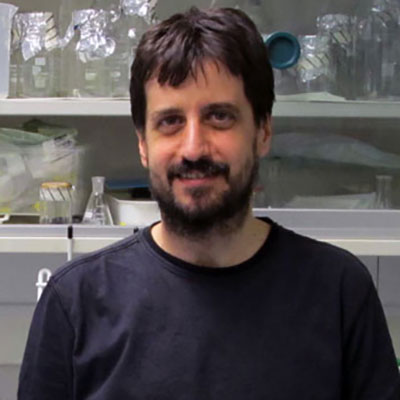 Jordi Alcaraz graduated in Phyisics at the Universitat de Barcelona (UB) and obtained his PhD in Biophyisics in the fields of Cellular Biophysics and Nanobioengineering in 2002. During his postdoc he pursued research aiming to understand how biophysical cues from the tissue microenvironment control differentiation and cancer progression at the single cell level. Currently he is a Serra-Húnter associate professor of the School of Medicine and Health Sciences at the UB since 2012, where he leads the “Translational Lung Mechanobiology” group. He is also a researcher of the Functional Unit of Thoracic Tumours at the Hospital Clinic of Barcelona and of the Spanish Respiratory Diseases Networking Biomedical Research Centre (CIBERES).His research line is focused in the study of how the microenvironment controls cell behaviour and misbehaviour in normal and diseased conditions, particularly in lung cancer and fibrosis. Their goal is to define new therapeutic strategies against these diseases as well as to identify novel biomarkers. For this purpose, the group works in close collaboration with clinical groups, and often use primary tissue cells from patients. Prof. Alcaraz’s contact information at the UB can be found here. |
CARLOS ALEMÁN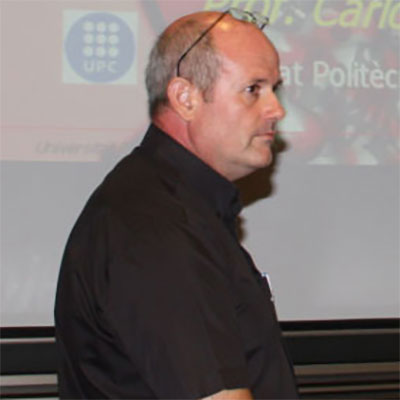 Carlos Alemán is Full Professor in the Department of Chemical Engineering in the Universitat Politècnica de Catalunya (UPC). Since 2003, he leads the Innovation in Materials and Molecular Engineering (IMEM). His research interest is focused on the utilization of conducting polymers, alone or combined with bio(macro)molecules for the development of biomedical and energy storage devices. In the last years, his group has developed electrochemical invasive and non-invasive sensors for the detection of biomolecules on demand release systems using electrical stimulation, smart devices for the simultaneous release and real-time monitoring of drugs, and flexible (bio)organic supercapacitors, some of them to power implantable biomedical devices.He has been awarded the Distinction for “Young Researchers to the Promotion of the University Research” by the Generalitat of Catalunya in 2003, the “I3 Research Intensification Award” in 2007 and two ICREA Academia Awards (2008-2015).Prof. Aleman’s contact information at the UPC can be found here. |
MARINO ARROYO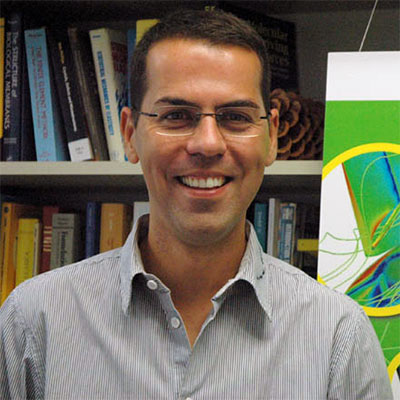 Marino Arroyo is Full Professor at the Universitat Politècnica de Catalunya (UPC), where he is a member of the Laboratory of Computational Methods and Numerical Analysis (LaCaN) group.Before joining the UPC, he obtained a PhD from Northwestern University, was a postdoctoral scholar at the California Institute of Technology (Caltech) and a long-term visitor at the Institute for the Mathematics and its Applications (University of Minnesota). He has been awarded the O. C. Zienkiewicz Award for Young Scientists in Computational Engineering Sciences by ECCOMAS (2010), two ICREA Academia Awards (2009, 2015), and the ASME/BOEING Structures and Materials Award (2003). He has also been the Timoshenko Visiting Scholar at Stanford. He was awarded a ERC-Starting in 2009 and a ERC-Consolidator Grant in 2016. In 2016 he came third, alongside IBEC group leader and ICREA research professor Xavier Trepat, in the La Vanguardia Science Award for their groups’ research that was published in Nature Materials. His research goal is to develop theories and computational methods to understand the small-scale mechanics of materials and biological systems, with a recent emphasis on cell and tissue mechanobiology and bio-inspired materials.Prof. Arroyo’s contact information at the UPC can be found here. |
ALÍCIA CASALS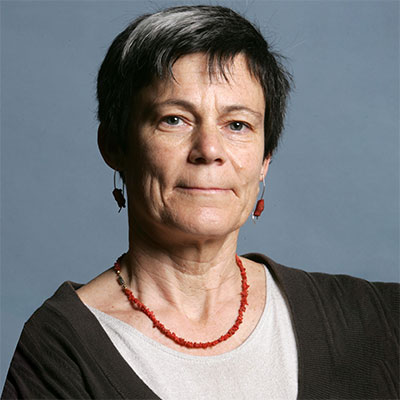 From 2008-2015, Alícia Casals led the Robotics group at IBEC. While at IBEC she began a spin-off company with the UPC, Rob Surgical Systems, which aims to develop a minimally invasive robotic station for surgery, Bitrack, and also worked alongside researchers at the Institut de Recerca de l’Hospital de la Santa Creu i Sant Pau and at the UPC on the development of Surgitrainer, a training platform for laparoscopic surgery. The group was awarded European funding for projects such as HYPER, which aims to develop new treatments in neurorehabilitation and help with patients’ mobility, and RecerCaixa funding for InHANDS (“Robòtica interactiva per a l’assistència humana en l’entorn domèstic”) and “Desenvolupament d un sistema robòtic de baix cost d ajut a la rehabilitació de la marxa per a nens amb transtorns motors greus”.Alícia was recognized for her work as a research scientist in the “16 Científiques Catalanes” exhibition being organized by the Associació Catalana de Comunicació Científica in 2010, and immortalised as a notable representative of the field of industrial engineering in the educational card game “La paciència és la mare de la ciència” by IEC’s Secció de Ciències i Tecnologia, and in 2015 she received a 2015 fem.talent Award at the fem.talent Fòrum in Barcelona. Prof. Casals’ contact information at the UPC can be found here. |
MARIA-PAU GINEBRAMaria-Pau Ginebra is Full Professor in the Department of Materials Science and Metallurgy and director of the Biomaterials Division of the Research Centre for Biomedical Engineering at the Technical University of Catalonia (UPC) in Barcelona, Spain, where she leads the Research group on Biomaterials, Biomechanics and Tissue Engineering. She has received numerous awards, amongst them the ICREA Academia Award in 2008 and 2013 and the Narcis Monutriol Medal in 2012 from the Generalitat de Catalunya, and the Racquel LeGeros Award, from the International Society for Ceramics in Medicine, for her contribution to calcium phosphate research, in 2013. Her research interests include the design and development of new biomaterials for bone regeneration, bone tissue engineering and drug delivery. Her research team has made significant contributions in the processing and characterisation of a new generation of calcium phosphate-based materials which mimic bone extracellular matrix, including calcium phosphate cements and foams, incorporating synthetic or natural polymers, and/or biologically active molecules. She is involved also in new biofabrication strategies, including injectable scaffolds for bone tissue engineering, bioinspired substrates and 3D printing of regenerative medical implants. She has been involved in numerous national and European research projects and participated in the organisation of scientific events in the area of biomaterials and bioceramics. She is author of more than 150 articles in peer-reviewed International journals as well as of 9 patents. In 2013 she founded the spin-off company Subtilis Biomaterials. Prof. Ginebra’s contact information at the UPC can be found here. |


